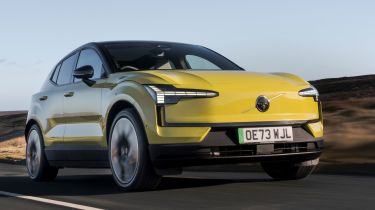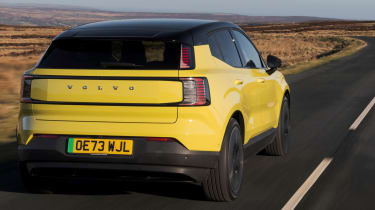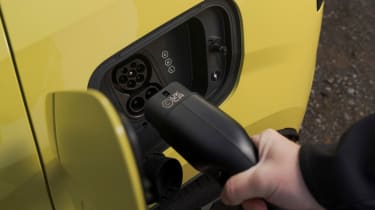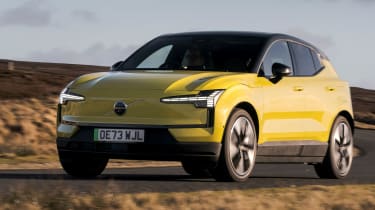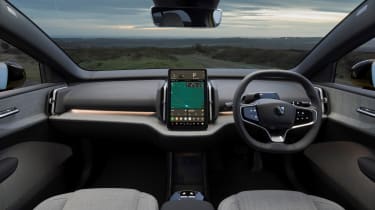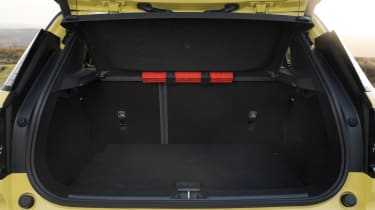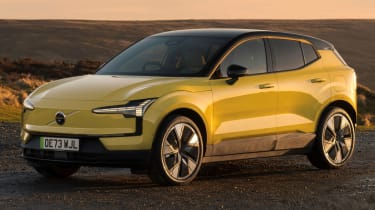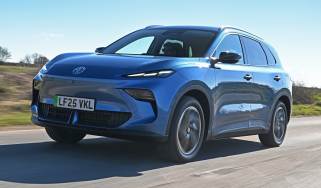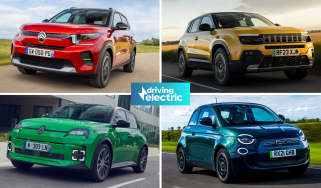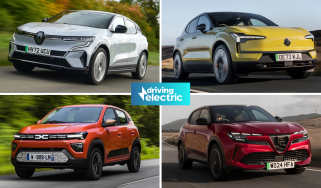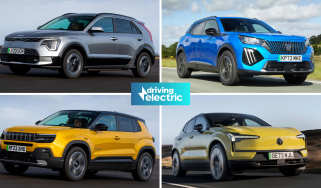Volvo EX30 review
The Volvo EX30 is fast, desirable and offers superb value for money
Pros
- Appealing price
- High quality cabin
- Fun to drive
Cons
- Limited rear legroom
- Lack of physical buttons
- Mediocre warranty
Volvo EX30 verdict
The Volvo EX30 is a fantastic small electric SUV that offers great value for money. It not only drives beautifully and looks stunning but also boasts excellent build quality and a commitment to sustainable materials. While the over-reliance on touchscreen controls is a bit frustrating and the lack of rear space might put off some buyers, the EX30 nevertheless manages to deliver electric SUV desirability at a truly tempting price.
| Range | Wallbox charge time | Rapid charge time |
| 214-280 miles | 9-11hrs (0-100%, 7.4kW) | 26 mins (10-80%, 175kW) |
Details, specs and alternatives
We were a little taken aback when the EX30 first launched; we knew for quite a while that a smaller sibling to the Volvo EX40 (once called the XC40 Recharge) was on the way, but we didn’t expect it to come at such a bargain price. Starting at around £35,000 for the entry-level Core Single Motor model, the Volvo EX30 really is quite a steal, especially considering the impressive features it offers.
A smaller 51kWh battery that provides a range of up to 214 miles means the EX30 Single Motor is really aimed at city drivers or those looking to use the electric Volvo SUV as a second car. Don’t disregard it too quickly, though; you still get the same sleek looks, sustainable materials, and top-notch Google-powered tech that the rest of the range boasts.
Meanwhile, the Volvo EX30 Single Motor Extended Range gets, as its name suggests, a single 268bhp motor to drive the rear wheels, plus a 69kWh battery to provide an impressive range of up to 296 miles. You might also be tempted by the Twin Motor Performance Model, priced at around £42,500, which can reach 62mph in a lively 3.6 seconds thanks in part to having four-wheel drive. However, it's worth mentioning that this model sacrifices some range, dropping down to just shy of 280 miles from its 69kWh battery. In our opinion, the Single Motor Extended Range, with its 5.3-second 0-62mph time and better overall driving experience, is a more sensible choice.
The Volvo EX30 is offered in two trim levels: Plus and Ultra. The former should be sufficient for most, however, as it gets all the niceties you’d expect from a Volvo such as full LED exterior lighting, two-tone alloy wheels, a 12.3-inch touchscreen (more on that later), dual-zone climate control, heated front seats, a heated steering wheel, a Harman Kardon sound system, a wireless mobile phone charging pad, a powered bootlid, adaptive cruise control, blind-spot monitoring, front-and-rear parking sensors and a reversing camera. You also get a choice of two interior ‘themes’: ‘Indigo’ and ‘Pine’ – essentially a posh way of saying ‘Navy’ or ‘Green’.
The top-spec Ultra specification is only available with the Single Motor Extended Range and Twin Motor Performance powertrains. This adds around £8,000 to the purchase price but brings luxuries like a panoramic glass roof, electric front seats, 20-inch wheels, a 360-degree camera and a heat pump – a nice addition given how cold it can get here in the UK in the winter.
In terms of design, the EX30 showcases the signature Swedish charm we’ve come to expect from modern Volvos with its Thor's Hammer headlights, pronounced shoulder lines, and high mounted rear lights. The absence of a front grille makes it stand out next to other Volvo models, as does the contrasting roof which works to create a sleeker look by hiding the EX30’s boxy SUV dimensions.
The EX30 is initially being built in China, although production will subsequently be moved to Volvo's Ghent plant in Belgium from 2025 as part of the company's sustainability plans. Volvo has also introduced a new agency agreement with dealers, meaning that the EX30 and other Volvo models will be purchased directly from the company. Buyers will still have a range of traditional purchase options, leasing and subscription plans to choose from.
Range, battery size & charging
| Model | Range | Wallbox charge time | Rapid charge |
| Single Motor | 209 miles | 9hrs (0-100%, 7.4kW) | 26mins (10-80%, 175kW) |
| Single Motor Extended Range | 296 miles | 11hrs (0-100%, 7.4kW) | 28mins (10-80%, 175kW) |
| Twin Motor Performance | 280 miles | 11hrs (0-100%, 7.4kW) | 28mins (10-80%, 175kW) |
There are two battery sizes available in the Volvo EX30: the 51kWh unit in the standard car and the larger 69kWh pack in the Extended Range and the all-wheel drive Twin Motor versions. The WLTP combined range for the base model is 214 miles, which is roughly the same as what you can expect from a similarly-priced Fiat 500e or Vauxhall Mokka Electric.
Mouthful of a name aside, the EX30 Single Motor Extended Range model should offer sufficient range for most buyers, with a maximum of 296 miles. Twin Motor Performance cars utilise the same 69kWh battery pack, however, due to the extra power that’s on offer, need plugging in after just 280 miles – or, from our experience, a lot less if you’ve got a heavy right foot.
When the Volvo EX30 needs plugging in, it’ll take around eight hours to charge the smaller 51Wh battery from flat to full via a 7.4kW home wallbox charger. The larger 69kWh pack increases this time to around eight hours. If you have access to a sufficiently fast DC ultra-rapid charger, Volvo claims that every variant of the EX30 can be topped up from 10-80% in under half an hour, provided you hook up to a 175kW charging station.
Running costs & insurance
It wears a premium badge, but the Volvo EX30’s starting price of around £35,000 places it among much smaller rival EVs like the Vauxhall Corsa Electric, Peugeot E-208 and BYD Dolphin.
There’s more good news, too, as this small SUV should also prove very affordable to run. Electric cars are much cheaper to ‘fill up’ compared to their equivalent combustion models, especially if you charge up at home via an EV-specific energy tariff. EVs are also exempt from VED road tax.
If you’re thinking about using the Volvo EX30 as a company car, you’ll also enjoy the 2% Benefit-in-Kind (BiK) tax rate until April 2025. The London Ultra Low Emission Zone (ULEZ) won’t be a concern, either.
Don’t expect rock-bottom insurance premiums, though; in fact, the Volvo EX30 has the highest insurance rating of any small electric SUV, occupying groups 35-40, depending on which model you choose.
Performance, motor & drive
| Model | 0-62mph | Top speed | Driven wheels | Power |
| Single Motor | 5.7s | 112mph | Rear | 268bhp |
| Single Motor Extended Range | 5.3s | 112mph | Rear | 268bhp |
| Twin Motor Performance | 3.6s | 112mph | Four | 422bhp |
The Volvo EX30 might be a sensible small electric SUV, but it’s up there with the best handling Volvos we’ve driven in recent years. This might sound like faint praise, but it really isn’t.
The powertrain has a user-friendly nature that’s typical of the best modern EVs, with fast responses and more power available than most drivers are ever going to use – especially in Twin Motor form, which is fast enough to make even a Porsche Taycan sweat. The one-pedal driving function immediately feels natural, the car slowing progressively to a stop when you lift-off the throttle. We enjoyed the elevated driving position – SUVs used in towns do get some stick but the all-round visibility afforded by the EX30 makes it very well suited to urban environments.
You aren’t going to get too shaken-up by this compact Volvo either. The suspension may be on the firm side, but this helps to disguise the weight of the battery and, along with nicely-weighted steering, actually makes the EX30 pretty handy to drive on twisty roads. It’s not uncomfortable when things get bumpy, either, with the Volvo offering a far superior level of comfort and composure that its somewhat fidgety Smart #1 sibling.
Interior, dashboard & infotainment
Inside, the EX30 isn’t going to disappoint. Volvo's attention to detail is evident, with high-quality sustainable materials used throughout the cabin. No less than 25 per cent of the car is made from recycled aluminium, 17 per cent is recycled steel, and 17 per cent is recycled plastic.
Buyers have four ‘room themes’ to choose from, each offering a different feel and utilising various textures, colours, and sustainable materials. Our test drive included models featuring panels made from recycled PVC window frames, as well as a warmer textile made from recycled denim – there’s no animal-based materials to be seen.
It's worth mentioning, though, that the EX30 relies heavily on its 12.3-inch touchscreen for almost all of the controls. While we don’t mind that you have to delve into the screen to adjust the mirrors – most drivers will only ever do this once or twice across the entire period of ownership – we can’t help but feel physical buttons for things like the window demister could have made the whole user experience more accessible and intuitive.
Setting aside the questionable ergonomics of having many of the driving functions on the main touchscreen, though, and the EX30’s infotainment system is very impressive. It runs an Android-based operating system, which means Google Maps software is built in. The end result is a set-up that looks great, loads incredibly quickly, responds to touches well, and can plot a route that avoids traffic jams, thanks to the huge depths of data that Google can access.
Direct access to apps such as Spotify lets you make the most of the punchy Harman Kardon sound system, while the hi-res 360-degree parking cameras relay your distance from objects in centimetres. It’s not the first car to adopt this system, but it’s a great idea that we wish more brands would use.
When it comes to audio, don't worry about the absence of speakers in the doors. Volvo has partnered with Harman Kardon to install a soundbar just beneath the windscreen. This seven-speaker sound system delivers an impressive audio experience with balanced sound and ample power. Volvo has also added a touch of novelty, using sound effects for the indicators that mimic the sound of a breaking twig. That sound is projected through the speakers so that it moves to the right when you’re turning right and to the left when you’re turning left. It’s an amusing touch.
Boot space, seating & practicality
| Length | Width | Height | Boot space (seats up/down) |
| 4,233mm | 1,836mm | 1,555mm | 318/904 litres |
The EX30 has a five-seat configuration with the two front chairs offering excellent levels of comfort. Volvo has a great record of delivering really supportive seating in its cars and nothing has gone awry with this lower-priced model.
That being said, rear passengers may still be uncomfortable in the EX30 due to the limited space available in the second row. While it's suitable for occasional use, taller individuals may find their knees pressed up against the front seats – thanks to the EX30’s boxy shape, headroom is pretty decent, though. Installing a large child seat may also pose some challenges, although the wide-opening doors help ease the process. The middle berth is also very narrow, as is the norm in cars of this class.
Storage has also been carefully considered. There's a deep tray between the driver and front passenger, which also includes wireless phone charging. The centre armrest features slide-out cup holders, one at a time. However, it took us a while to locate the opening for the central glovebox, which is cleverly concealed within the touchscreen.
The boot offers a sensible 318 litres of space, which can be expanded to 904 litres with the seats folded. A false floor is available for hiding cables, or you can store them in the frunk (front boot). Volvo has even conveniently stamped a "will it fit?" graphic on the boot door to help you make informed decisions about what to carry and how to load it.
Reliability & safety rating
All Volvo EX30 models are well up to scratch in terms of safety kit. In terms of active safety technology, there’s front and rear cross traffic alert with auto braking, lane departure warning, collision avoidance and a load of other features to intervene if sensors detect an imminent problem. There’s also the usual airbags and Volvo’s whiplash injury protection system.
Unfortunately, there have been stories of EX30s being plagued by software gremlins, and this is particularly bad news when you remember the car’s heavy reliance on its touchscreen. If things do go wrong, Volvo’s three-year, 60,000-mile warranty does pale a bit in comparison to the seven years of cover provided by Kia and MG.
Volvo’s battery cover is a bit more generous, though, as it lasts for eight years or 100,000 miles (whichever comes first).

